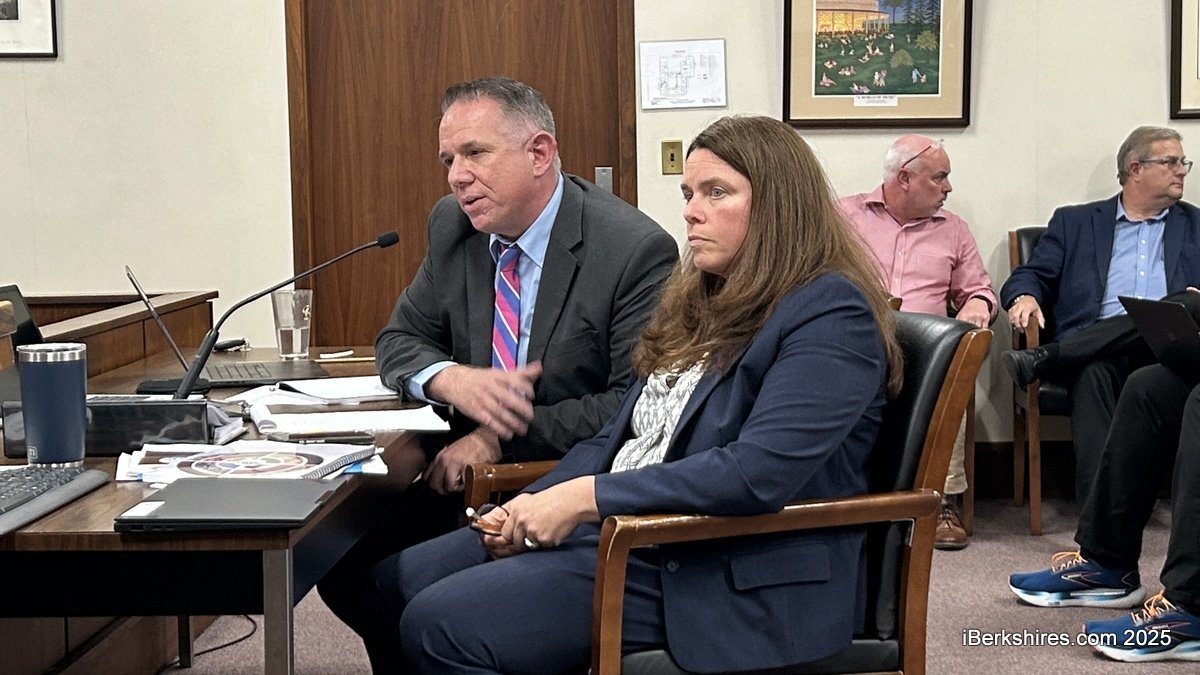Pittsfield Council Preliminarily OKs School BudgetBy Brittany Polito, iBerkshires Staff
05:43PM / Thursday, May 22, 2025 | |
 Superintendent of Schools Joseph Curtis and Assistant Superintendent for Business and Finance Kristen Behnke answer questions from the City Council during a review of the school budget on Wednesday. Superintendent of Schools Joseph Curtis and Assistant Superintendent for Business and Finance Kristen Behnke answer questions from the City Council during a review of the school budget on Wednesday. |
PITTSFIELD, Mass. — The City Council kicked off budget season on Wednesday with a preliminary approval of the Pittsfield Public Schools' $86 million spending plan.
The $86,450,361 budget for fiscal year 2026 includes an $18 million city contribution and more than $68 million of anticipated Chapter 70 funding. It is a $3,765,084 increase from FY25, totaling $86,900,361 with $450,000 in school choice and Richmond tuition funds.
"The Pittsfield Public School system is in a vital place in time," Mayor Peter Marchetti said.
"It is now our time to do the right thing and to fund our schools at the level that we can, and look forward to what the future brings us."
He emphasized that the city's contribution went down nearly $1 million from FY25 to FY26.
"The increase of the school department budget from fiscal year 25 to fiscal year 26 was $3,765,084. I will tell you that the Chapter 70 increase was $4.5 million," Marchetti reported.
"So the increase that we were getting from Chapter 70 monies, we kept some of that on the city side to help defray the cost of the rising health insurance. With this budget, it impacts positions, but will impact no city personnel."
Last year, local and statewide advocacy led to a correction in Chapter 70 funding, adding another $2.4 million in aid for fiscal year 2025.
"Thank you for doing that, you're the reason we have more funding," Ward 5 Councilor Patrick Kavey said to Assistant Superintendent for Business and Finance Kristen Behnke, who found 11 unaccounted low-income students in the district, bumping the PPS back into a higher reimbursement group.
Councilor at Large Alisa Costa asked how equity plays a role in the budget, saying, "For me, equity is about making sure it's not equality, like each school gets the same amount, but equity is about getting looking where the need is greater to make sure that there's more of a level playing field."
"Over the recent years, we feel it's incredibly important to empower the leadership team at each school, along with their school councils and staff, to really decide, what, if you will, will bring greater access and equity to their students," Superintendent Joseph Curtis explained.
"And that's where you do see some different staffing models."
Aside from a sense of equity being good practice, Behnke pointed out that the district must also meet a maintenance of effort requirement stipulating that federal funding recipients must maintain a certain level of financial contribution for a specific program to remain eligible, and the instructional equity requirement for Title I schools.
In FY26, there were more than $5 million in contractual increases and additional obligations. The nearly $1.3 million budget gap was said to be bridged through job movement, attrition, retirements, and eliminating positions, not bodies.
During public comment, former councilor Karen Kalinowsky said the budget is "overloaded with administrators." In FY26, the central office reduced a half-time arts integration position and a full-time intervention implementation coordinator that was grant-funded.
"I don't know where the money's going, why the budget keeps going up, but that's an issue," she said.
|

